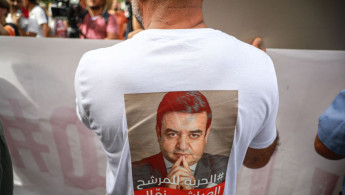In defiance of Kais Saied: Jailed Tunisian Presidential candidate Ayachi Zammel becomes national hero
In Tunisia, Ayachi Zammel, a little-known presidential candidate, is swiftly becoming a folk hero after receiving a 12-year prison sentence for allegedly committing "election fraud".
"Let's turn the page"—his promise to usher in a new era where the people would truly rule—has now become the profile picture for many Tunisians, who see Zammel as the country's last hope against President Kais Saied's increasing totalitarian grip on power.
"Zammel is the only one offering us a clear vision of how to do things differently than Saied," says Ziad El-Henni, a Tunisian journalist tried in January for allegedly "undermining the person" of Minister of Commerce Kalthoum Ben Rejeb during a radio show.
El-Henni, like many voters who had been considering boycotting, is now rallying for Zammel's victory in the 6 October election.
When Zammel first announced his candidacy, Mosaique FM, one of Tunisia's top radio stations, described him as a "relatively unknown figure" with little political background.
The 47-year-old engineer looked nothing like Tunisia's past political giants—neither Ben Ali's extravagance nor Saied's poetic flair.
Local website Business News went as far as to question why he was even running, describing his candidacy as out of place.
Zammel's platform was initially vague, but it quickly sharpened its messages when Zammel stood with arrested politicians and promised Tunisians the restoration of democracy and freedom.
His real momentum started when he was arrested on 2 September for allegedly submitting forged endorsement signatures. A court in Manouba released him, but he was rearrested by the Jendouba court on the same charges.
Will Zammel be disqualified?
On 1 October, just five days before the election, Zammel's lawyer, Abdessattar Massoudi, announced that a court had sentenced him to 12 years in prison for forging documents. According to Massoudi, Zammel faces 37 additional cases across Tunisia, all related to election violations. Nonetheless, his right to continue campaigning remains intact.
Opposition figures, including essayist Hatem Nafti, view the case against Zammel as politically motivated, reflecting "President Saied's anxiety about his own chances of winning."
Lawyer Dalila Ben Mbarek, who is also on trial, explains, "The ruling does not annul his candidacy or his votes… It was issued after his candidacy was accepted and has no retroactive effect." Ben Mbarek faces trial for "leaking confidential information" about cases against political detainees.
Nevertheless, Zammel's name appeared on ballots in Australia and Switzerland on 4 October, as the Tunisian diaspora began voting. He's competing against Kais Saied and Zouhair Magzhaoui, a former Saied ally.
Facing seasoned politicians with family legacies and extensive political experience, Zammel probably wouldn't stand a chance. However, things are different this election.
What are Zammel's changes of winning?
Initially, the Independent High Authority for Elections (ISIE) disqualified Saied's strongest opponents, citing non-compliance with the newly revised electoral law that President Saied rewrote in 2022.
Zammel is one of only three approved candidates, running against incumbent Kais Saied and Zouhair Magzhaoui, a pan-Arab politician.
The opposition seems to be struggling to unite behind one strategy: boycotting or voting.
Many had hoped to declare the election illegal, citing the ISIE's defiance of the Administrative Court's binding decision to reinstate three disqualified candidates.
However, on 25 September, the majority of Parliament—elected in ultra-low-turnout elections (with only 11% of voters participating)—approved a new decree stripping the administrative court of its authority to rule on election appeals.
On 3 October, prominent opposition figures, including Chaima Issa, Khayam Turki, and Ghazi Chaouachi, announced their initiative "Ahed Tounes," (Tunisia's promise) a political program aimed at ousting Saied through "peaceful civil means." Saied took over all extraordinary powers in 2021, and he wrote later a constitution that granted him more power.
The new initiative did not endorse any specific candidate, but its initial demands aligned with Zammel's: overturning the 2022 constitution that Saied drafted and passed in a low-turnout referendum.
Meanwhile, Olfa Hamdi, a former candidate disqualified due to the new age requirement, expressed her disappointment, saying it's unfortunate what has happened to Zammel and to every volunteer who has been prosecuted during this election process.
"Mr Zammel's arrest, and the fact that he is now facing election fraud charges, makes it very difficult to support his candidacy", she told The New Arab. She endorsed instead Magzhaoui despite "their differences."
However, other critics of Saied are backing Zammel's candidacy as an act of defiance against the incumbent president—once a constitutional law professor—who they believe is manipulating the justice system and exploiting legal loopholes to suppress his opponents.
In trying to crush Zammel, Saied may have unintentionally created his own nemesis—a 2019 version of himself, an outsider untainted by legacy parties like Ennahda, who lost the people's trust for past mistakes.
"In 2019, we noticed a last-minute surge of interest in Kais Saied among Tunisian voters. Today, we’re seeing the same phenomenon for Ayachi Zammel," confirms Mohamed Dhia Hammami, a Tunisian politics and security expert.
President Saied might have created his strongest challenger in the very mould that propelled him to power five years ago.




 Follow the Middle East's top stories in English at The New Arab on Google News
Follow the Middle East's top stories in English at The New Arab on Google News
![A group of Palestinians, foreign and Israeli activists gather to participated in an olive picking event on the land in the town of Battir, which is under threat of confiscation by Israel in Bethlehem, occupied West Bank on 8 November 2024. [Getty]](/sites/default/files/styles/image_330x185/public/2182930803.jpeg?h=199d8c1f&itok=__0LgGsa)

![People gathered around the rubble of destroyed houses to search for survivors [Getty]](/sites/default/files/styles/image_330x185/public/2024-11/GettyImages-2184733820.jpg?h=199d8c1f&itok=NiM1LO2f)